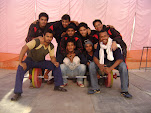My last post was about how the system originated and why it was actually favorable for the system to exist. A guy can know more about what his dad does than what someone else's dad does. And I have talked about 4 professions- Farming, breeding cattle, priesthood and ruling. Hindu society is divided into 4 varnas- Brahmana, Kshatriya, Vaishya and Sudra.
Before I proceed further, I'd first bash all the people who say this division is God's decision and that some class of people are just more privelaged than others and so on... In other words, who maintain that this division is a real genetic thing rather than just a classification based on profession. I'm talking about two different things- 1. People of one profession are grouped as one class and 2. People are divided into classes based on their parents' class and they have to stick to their profession. The first one has no discrimination at all, you choose your profession and then they call you by that name, like if I do a PhD, I'm called a doctor and if I failed in tenth exams, I maybe called a cupper. The second one is what I'm talking against.
If this division into varnas was done by the so-called 'God', why doesn't it exist anywhere else except in Hindu community? Muslims don't have this. In ancient Europe, there were just two classes, the commons and the nobles (and maybe another class of wealthy people) but nothing like what we have. There are a lot of tribal people living in forests and mountains, and they don't have any of these divisions. All they have is a ruler and other common people.
The reason behind the division into varnas is, there were these powerful guys, the rulers, who wanted their sons to be the next ruler. And all people around him had to support his son in order to impress the king and the son was obviously more qualified due to his exposure and hence he became the next king, and so on for all other castes. What is not very obvious is the fourth varna, called the Sudra.
Again, long long back, this division called 'Sudra' was just a class based on profession until the generations after those just kept doing the same jobs and it became hereditary and after a sufficient period of time, people were forced to believe that a guy had to do only what his ancestors did. But anyways, how did 'Sudra' varna come into existence? Why would any guy want to be serving others instead of doing something that can give him a respectable position?
Consider the way Shaastra or Saarang work- there are cores, coords and vols and gen insti junta who are not any of the three. Cores are like the best in the profession... like kings and emperors as opposed to local officers, wealthy men among merchants, 'Rajaguru's among priests, Court musicians and poets among artists and so on.. Then there are the coords, who are responsible for work. Like the general farmers, priests, potters, sculptors, etc... Then there are the volunteers, who couldn't get a coordship for themselves because they didn't qualify. There were people in the society who really couldn't do anything by themselves because they weren't talented enough or they didn't have the facilities, like land for a farmer. Volunteers have to work 'under' the coords, do whatever work coords ask them to do, to get their grub coupons and t-shirts. If you can't be a coord and you are not a vol, you just can't get coupons and t-shirts. If a man couldn't be employed himself, he had to serve someone to survive. Hence, there was a class of people working for someone else. This class was never allowed to do something more useful, because no one would teach his profession to his servant's son. And so we have this 'Sudra' class.
When the only way to learn was from a guy's parents, the caste system made sense. But now, how many guys really know what his/her dad/mom do? In villages, maybe there's some exposure, but in cities, a clerk's kid knows nothing about that. A police's daughter can't just be a police. Most of what a person learns is from some public school, along with a lot of other people. Hence the basic concept of caste system doesn't even hold. But thanks to all the political leaders who keep talking shit about castes and thanks to the government that makes no move to eradicate this system, we still have people 'belonging' to a caste.
Hoping that was a little enlightening. Comments are welcome. If someone wants to defend the caste system, I'm ready for a debate.. post your comment.
Next post will be on some Brahmin traditions, not what an arbit priest follows, but the original things that were started by those 'real' sages who existed long back.
Subscribe to:
Post Comments (Atom)

No comments:
Post a Comment